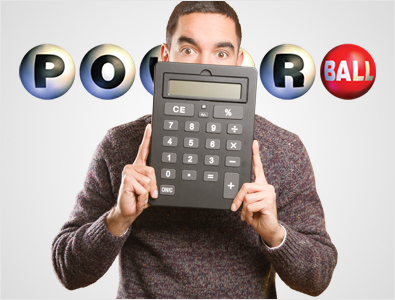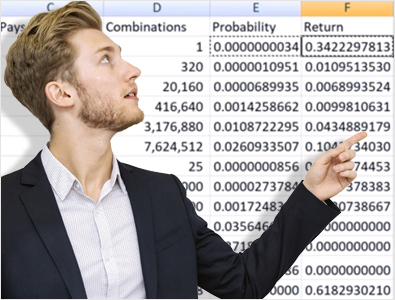Video On How to Calculate the Odds in the Powerball
Hi, this is Mike and the purpose of this video will be how to calculate the odds in the Powerball lottery and the return to player for a Powerball lottery ticket.
Hey, guys, this is Mike and you are going to learn how to calculate the probabilities in the Powerball. Everyone on my forum is complaining my videos run too long so I'm going to try to go through the math faster than I've done in previous videos.
Let me go over the rules real quick:
The lottery will draw five white balls numbered one to 69 without replacement, meaning that they can't draw the same ball twice and one Powerball from a different pool of balls that can be numbered one to 26.

The player will do exactly the same thing and hope that his numbers match with those drawn by the lottery. I already put in the pay table here for the jackpot, I put in $100 million to just put in anything. This video is going to assume that you're already familiar with the COMBIN function in Excel which is the number of ways to choose say X items out of Y.
If you don't know how to do that...
I recommend you watch my video on the probabilities in five-card stud poker which I just made yesterday.
Let's just jump right into it. There's obviously only one way that you can win the jackpot because you have to pick the exact numbers that the lottery did and there's obviously only one way to do that. All right if you get four out of the five white balls right and the Powerball, then you win $10,000. Before I forget to say this, a ticket costs two dollars.
What's the number of ways you can do that?
The number of ways you can do that is five choose three because there are that many ways to get three out of the five lottery balls and 64 choose two ways to pick two of the losing balls out of 64. 20,160 ways you can get three out of five in the Powerball. If you get two out of five and the Powerball, you win $7. The number of ways you can do that is 416,640.
If you get one number correct in the Powerball - you win $4 and there are about 3.2 million ways you can do that. If you get no white balls correct but you do get the Powerball, then you win $4. If you get the Powerball, you always win at least something. The number of ways to pick five numbers out of the 64 the lottery did not pick is about 7.6 million.
Now, let's look at the combinations if you didn't get the Powerball
Those are going to be simply 25 times the number of combinations if you did pick the Powerball because the lottery will pick just one Powerball, meaning that there are 25 numbers in the Powerball bin that didn't get picked. If you didn't get the Powerball, there's 25 ways you could not have picked it.

Let's just multiply all these combinations we just did by 25. You can see that the total number of combinations is 292,201,338. That is the same number that you often hear bandied around in the media as the probability of winning, meaning one in that 292 million figure. To calculate the expected return of your lottery ticket, let's calculate the probability of any given prize which is the number of combinations divided by the total combinations.
Now, let's look at the expected return of any given prize which is the probability of winning times the prize itself, and do that for every possible event. For a jackpot of 100 million, we see that for the $2 ticket you can expect to get back about 61.8 cents, that is equivalent to getting back about 30.9% of your money bet. Here we can see that the jackpot of 100 million contributes about 34.2% to that return. I mean, not percent, 34.2 cents to the value of that ticket. For every 100 million in the jackpot it's worth about 17.1% in expected return.
Now, before people say this in the comments, this does not consider three very important things:
- Number one - if you hit the jackpot, it gets paid in an annuity or you can take the lump sum option which is 61% of that jackpot.
- Number two, - taxes. If you win the jackpot, you can expect to pay a lot in taxes. I don't know the amount now, I'm sure it's less after the big Donald Trump tax cut but nevertheless, you can still expect to pay a pretty big portion in federal taxes not to mention state taxes.
- Finally - jackpot sharing. That's not much of a concern with the small jackpots but when the jackpots start to get huge, like approaching half a billion dollars, then everyone starts playing and there's a distinct possibility of multiple winners in which case you will have to split that jackpot with other winners if you win, probably.
Finally, let me say:
that the rules in California are different, they don't have fixed prizes but everything is on a pari-mutuel basis. Yes, there you go. Bottom line, the Powerball like all lotteries are a horrible bet, I recommend you don't waste your money on them.
For more information about the Powerball, I have a great deal of information on it on my website Wizard of Odds, a whole section on the Powerball, it gets into the expected ticket sales by jackpot size and how jackpot sharing affects your odds. Yes, this has already run over as much time as I hoped, I will let it go with that.
Thanks for watching.
Do you want to see your scrambled Rubik's Cube solved again? Use the online solver which can calculate the solution for you in seconds.


